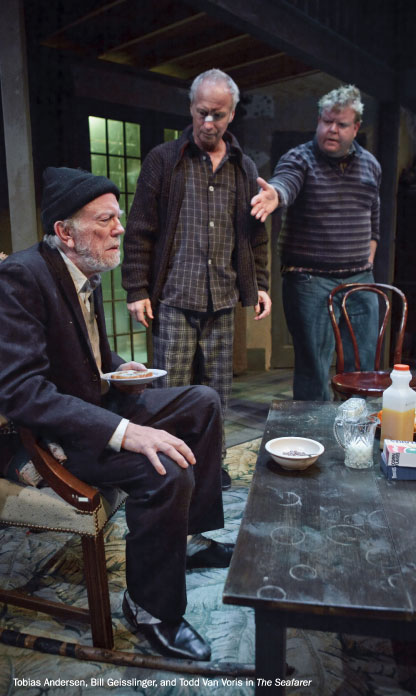
By Bob Hicks
On Saturday night, Mr. Scatter put on his professional drama-critic hat (it’s a metaphorical hat; it was a blustery evening, so he actually wore a rain jacket with a hood) and went to Artists Repertory Theatre to see Martin McDonagh‘s nasty little comedy The Lieutenant of Inishmore. He means that “nasty little comedy” bit in the nicest possible way: Inishmore is savage and bloody and brutal, and it’s true that more than one cat, in addition to several humans, who seem to deserve it more, comes to a violent end. But it’s also genuinely funny, in that nervous why-am-I-laughing-at-this way.
A brief review ran in Monday morning’s Oregonian, and you can read Mr. Scatter’s much more complete version online here at Oregon Live. He can imagine a more violently scary production, and he can imagine a more broadly comic one, but he thinks Artists Rep director Jon Kretzu and his cast got the balance about right.
McDonagh is a transgressive writer, dealing in that unruly space between myth and reality: another of his plays, The Pillowman, is about what happens when a writer’s tales of fantasy mayhem seem to be playing themselves out in real life. Like a lot of male playwrights (David Mamet and Neil LaBute come to mind) he’s fascinated with the nature and character of aggression, and his plays can slice both ways, reveling in the stuff as they dissect it. That makes the audience … not complicit, exactly, but responsible for sorting out its own attitudes on the subject.
Then again, that’s a good deal of what theater, or literature, or any art form is about: the beginning of a conversation. In the aggressive male metaphor, the first shot. It’s not just a conversation. The artist sets the terms, and to a significant degree is in charge of the show. But a willing and perceptive audience completes the connection and sets off ripples of meaning, each meaning a little bit different for every individual involved in the encounter.
McDonagh is a terrific storyteller, and he has some fascinating things to say about aggression, which if he’s wary about he also frankly enjoys. He’s got swagger and a bit of a bad-boy reputation, as this year-old story by Foster Kamer in the Village Voice suggests. It relates, among other things, McDonagh’s obscenity-laced threat to beat up fellow Irish playwright Conor McPherson (whose play The Seafarer was a hit for Artists Rep last season) for a perceived insult.
Just so long as he leaves McPherson’s cat alone.
